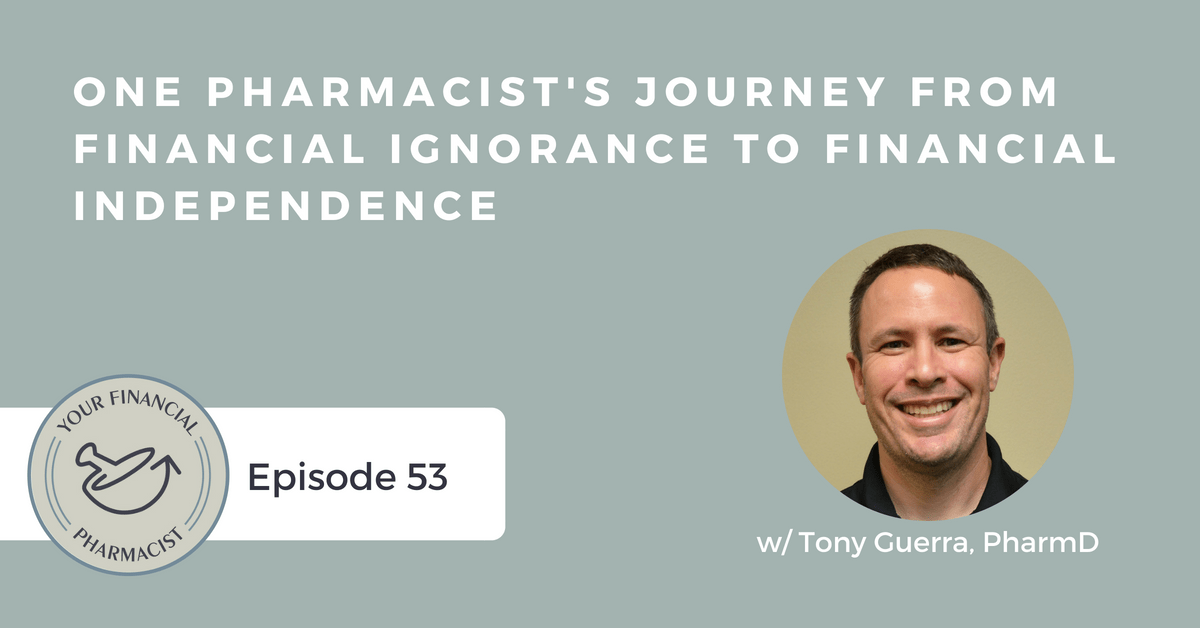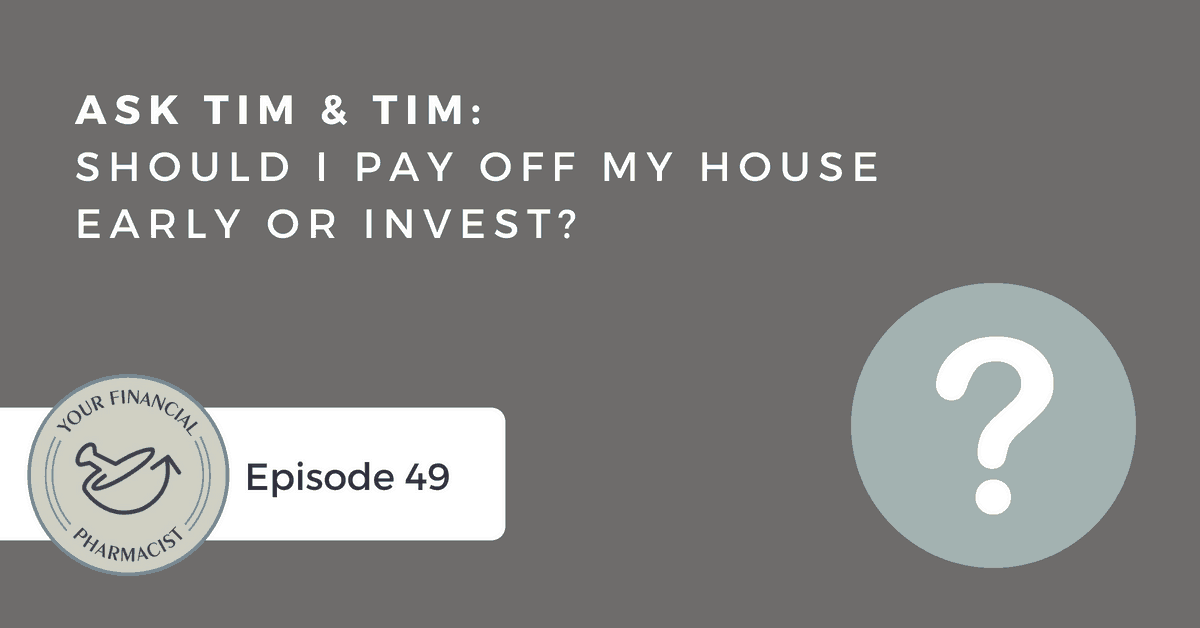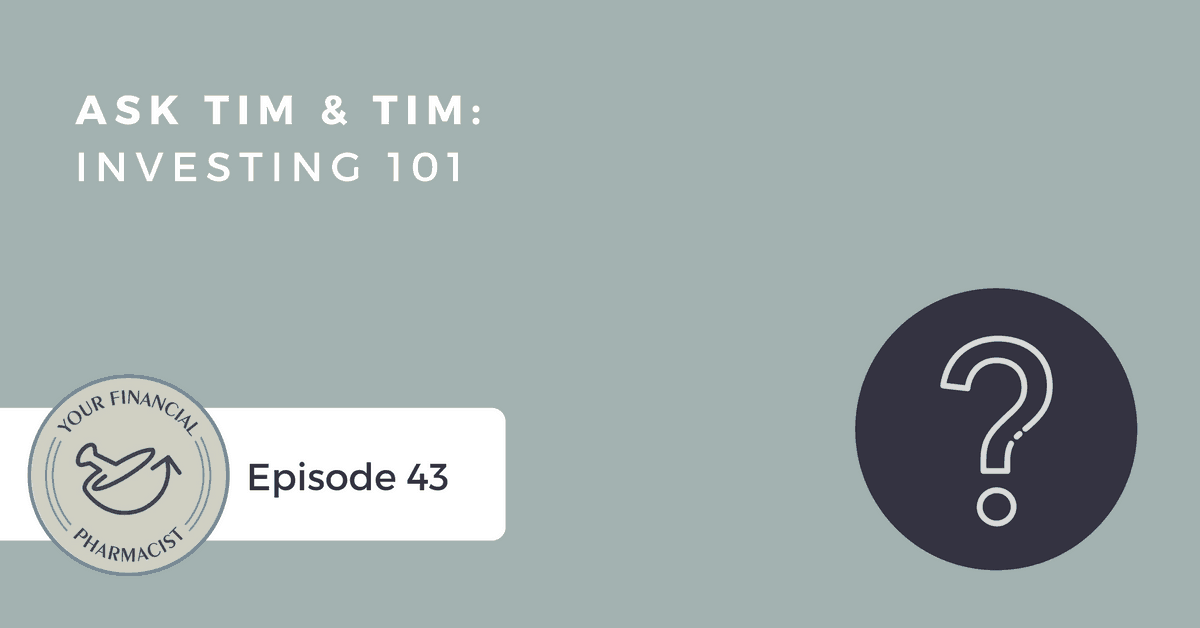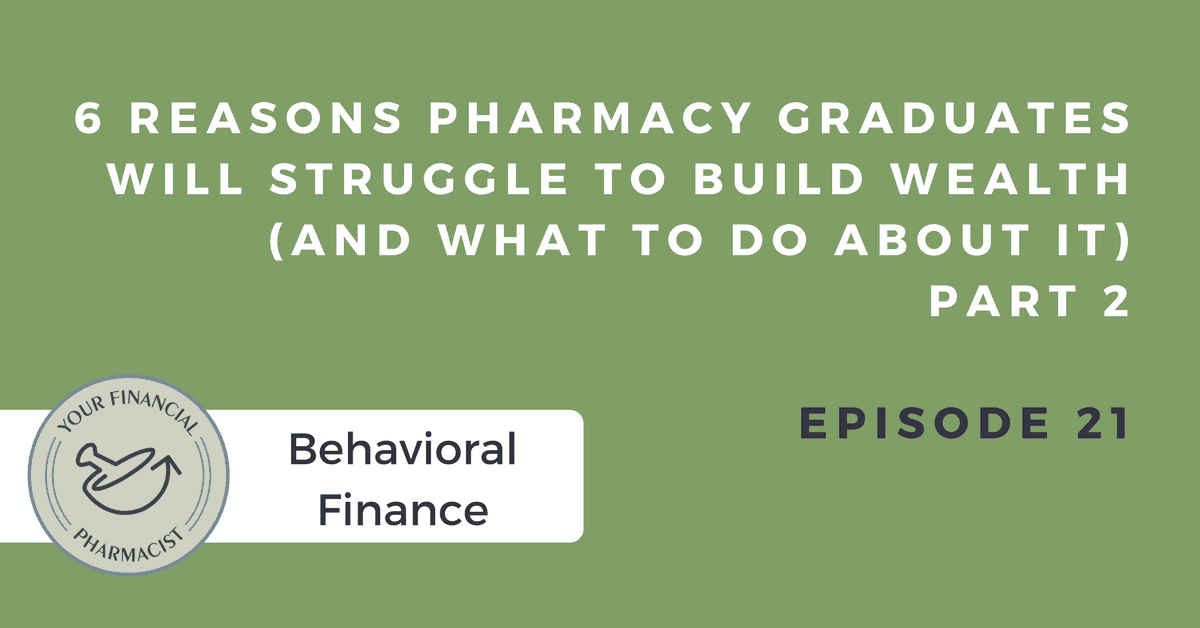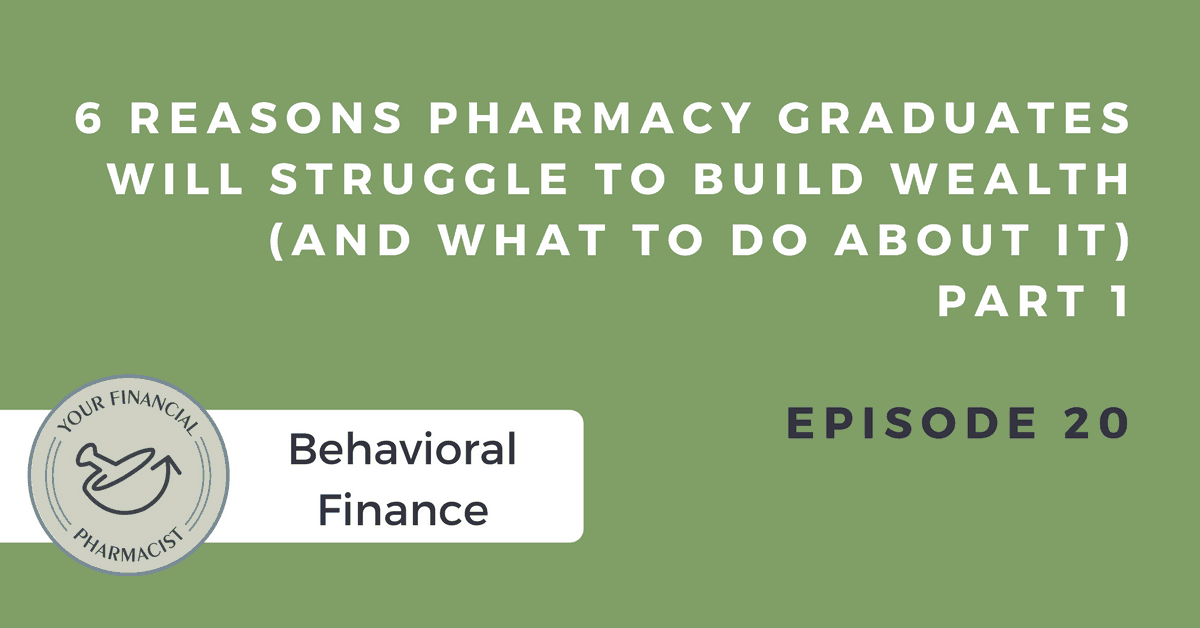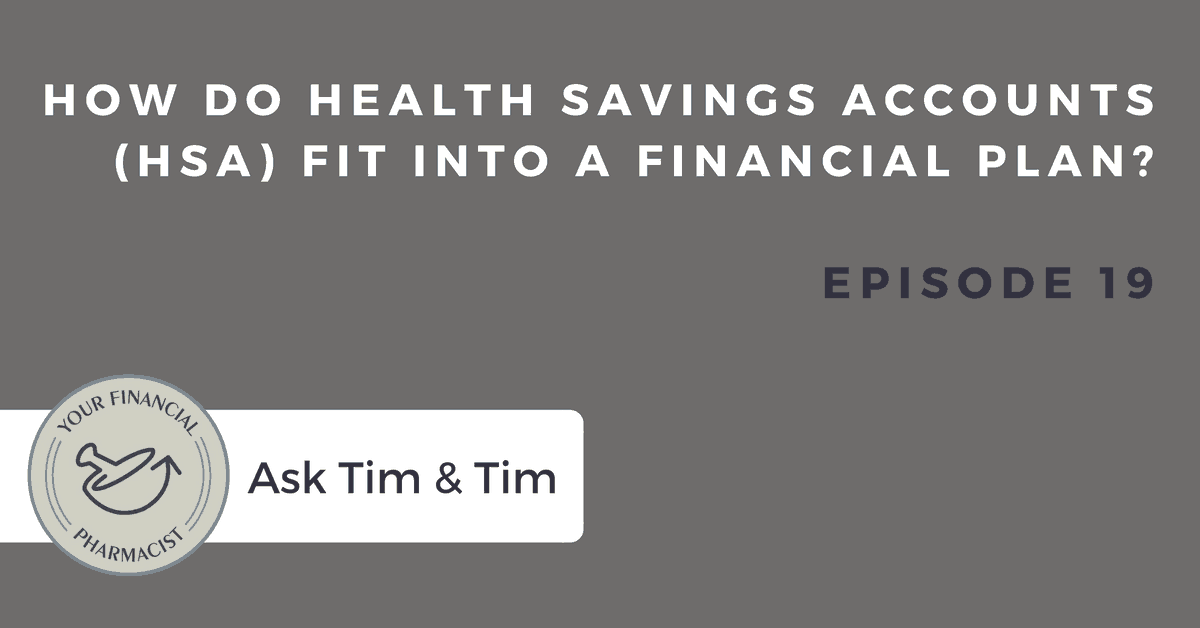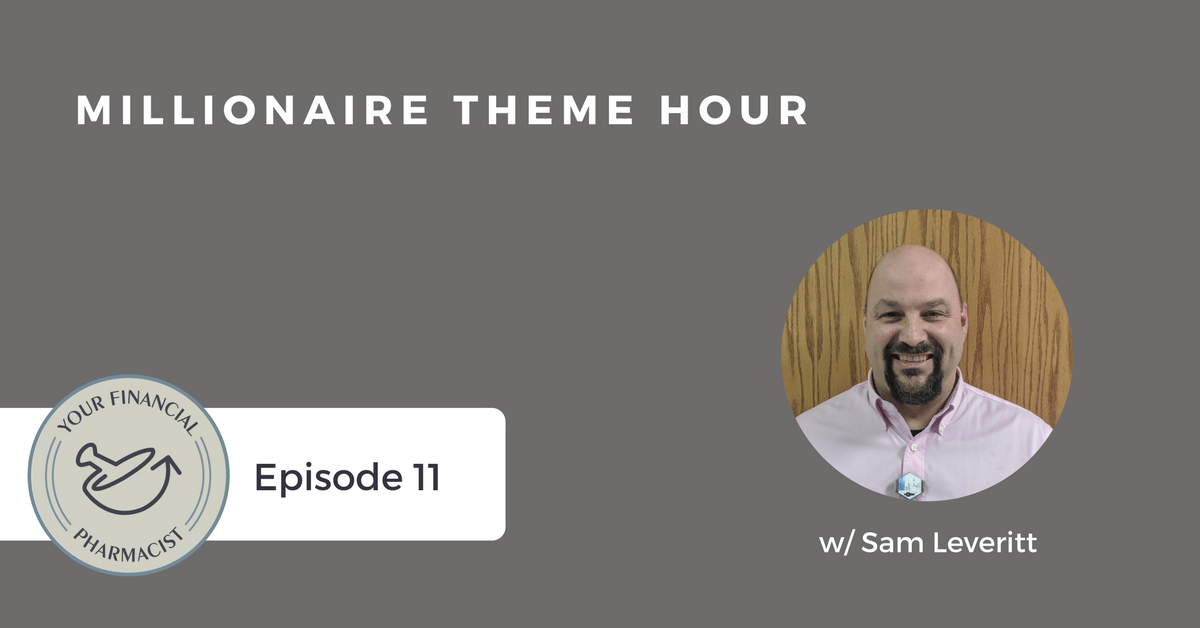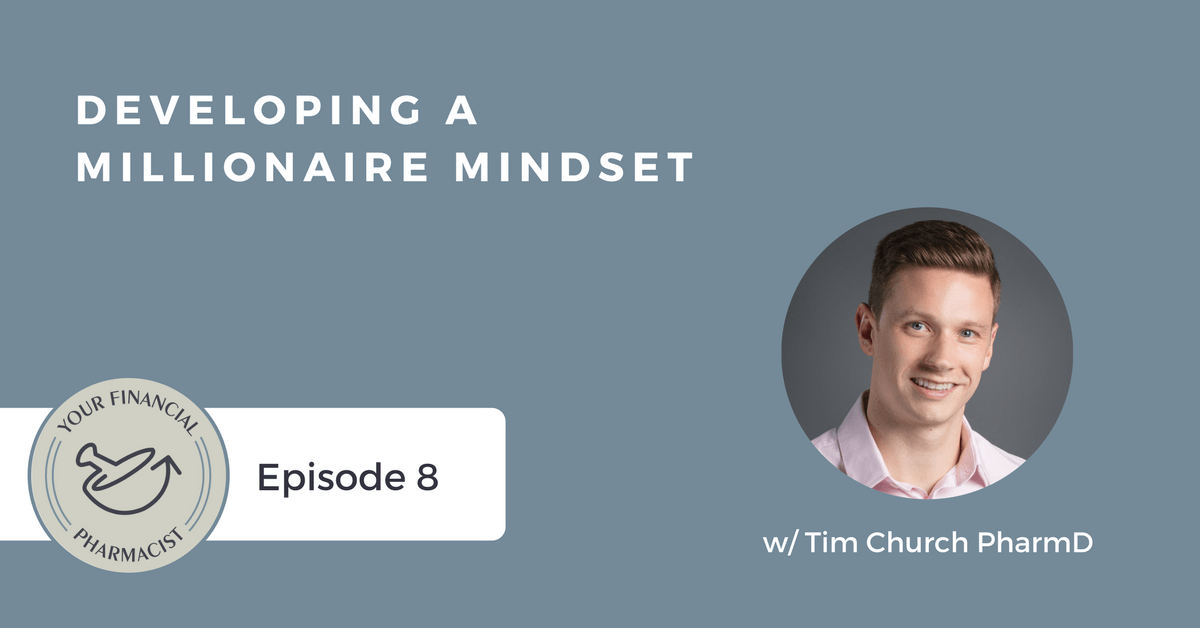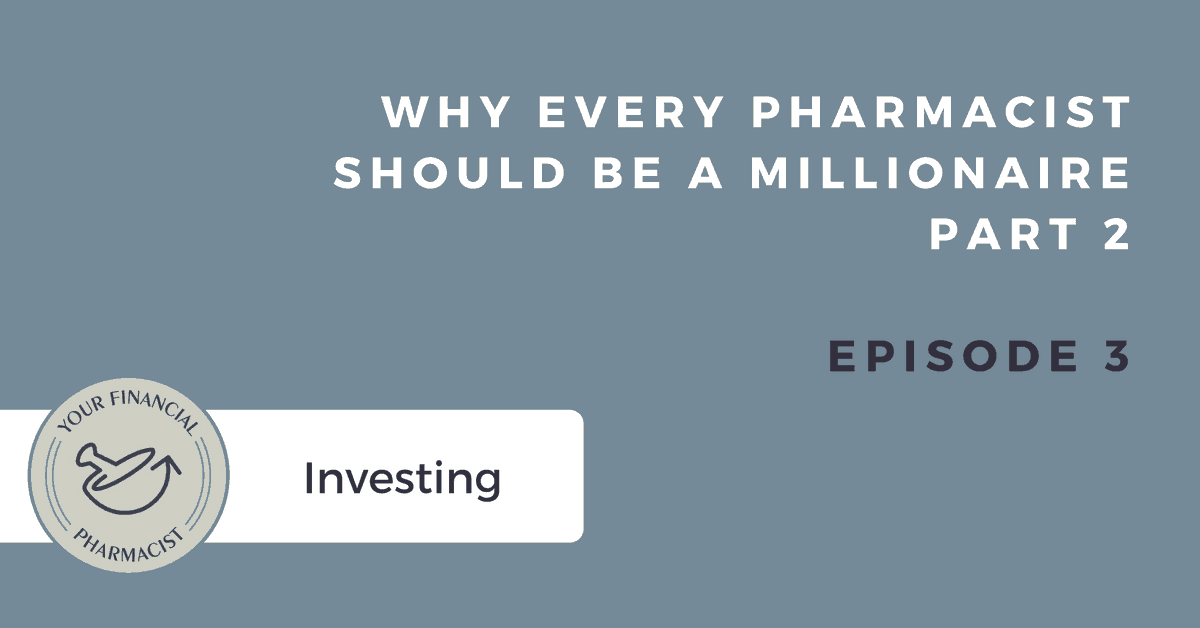On Episode 053 of the Your Financial Pharmacist Podcast, YFP team member Tim Ulbrich interviews Dr. Tony Guerra, an author, podcaster, entrepreneur, real-estate investor, educator and father to triplet girls that has an incredible story to share going from financial ignorance to financial independence. Tony talks about his financial journey, his various business ventures, and how and when his mindset shifted that allowed him to be on the path to financial independence.
About Our Guest
Tony Guerra graduated with a Doctorate of Pharmacy from the University of Maryland in 1997 and has followed a non-traditional career path to best suit his needs and interests. Tony has taken on the roles of pharmacist, homeowner, professor, real estate agent, author, mentor, podcast host, husband, and father of triplet girls while continually striving for financial independence. Through motivation and creative entrepreneurial thinking, Tony has created a lifestyle that allows him to focus on his family and his passions.
You can learn more about Tony and his work at http://MemorizingPharmacology.com
Mentioned on the Show
- Memorizing Pharmacology: A Relaxed Approach by Tony Guerra
- How to Pronounce Drug Names: A Visual Approach to Preventing Medication Errors by Tony Guerra
- Memorizing Pharmacology Mnemonics: Pharmacology Flashcards and Fill-Ins for the Future Nurse, Doctor, Physician Assistant, and Pharmacist by Tony Guerra
- Seven Figure Pharmacist by Tim Church and Tim Ulbrich
- First Time Pharmacist: Everything you didn’t learn in class or on-the-job training by Richard Waithe
- YFP Student Loan Course for Pharmacists
- Script Financial
- Brian Buffini
- Blair Thielemeir
- The New York Times Rent to Buy Calculator
- YFP Episode 040: 10 Things Every Pharmacist Should Know About Home Buying Part 1
- YFP Episode 041: 10 Things Every Pharmacist Should Know About Home Buying Part 2
- Pharmacy Leader’s Podcast
- Your Pursuit of Purpose Podcast
- The Five Love Languages: The Secret to Love that Lasts by Gary Chapman
- The Millionaire Next Door: The Surprising Secrets of America’s Wealthy by Thomas J. Stanley and William D. Danko
Episode Transcript
Tim Ulbrich: Hey, what’s up, everybody? Welcome to Episode 053 of the Your Financial Pharmacist podcast. We have an awesome episode in store for you today with a special guest, Dr. Tony Guerra that has taken a nontraditional path with his pharmacy career, which has allowed him to be on the path to financial independence. And I’m excited to have him on the show to share that story and journey today. And ever since I heard about Tony’s work more than a year ago and having the chance to learn about his background, I’ve been excited to get him on this show and to share his story with you, the YFP community. So Tony, thank you so much for taking the time to come on the YFP podcast.
Tony Guerra: Hey Tim, thanks for having me on.
Tim Ulbrich: So to be honest, Tony, there’s lots to talk about today. The more I dug into your background and story, the more I thought, where do we even start with this? We’ve got your fascinating pharmacy career, the real estate that you’ve been involved with, successful business ventures, and so I think maybe the best place to start is let’s go all the way back to when you graduated from the University of Maryland in 1997 with your pharmacy degree. So tell us a little bit about your first job out of school and what was your financial situation right away after you graduated?
Tony Guerra: Well, first, thanks for having me on the show. I actually listen to every single one of your podcast episodes, so I’m honored to be No. 53.
Tim Ulbrich: Thank you.
Tony Guerra: And my journey was a little bit different in that, you know, so many students right now are graduating, want to do residency, do 40-60 hours a week. When I sat down for the interview to work for Walgreen’s when I graduated to go to the Phoenix area, I actually asked to work only 24 hours a week or three days a week. And he talked me into four days a week, or 32 hours a week. So I had no interest in maxing out the number of hours I had, and my situation’s a little bit different because they had doubled our tuition from BS to PharmD, but my tuition was $4,000 a year.
Tim Ulbrich: Wow.
Tony Guerra: So I had $16,000 total in tuition. So my situation there is a little bit different, and before people hang up like, this guy doesn’t have any problems, let me talk about the mistakes that I made. So the issue with Maryland is that New Jersey and Atlantic City is not that far of a drive away. So a lot of times my buddies and I would go up to Atlantic City, and the most important thing that we had to do was because in New Jersey you can’t pump your own gas, we just had to have enough money left over to have a tank of gas or at least half a tank of gas to get us back to Maryland. So when I talk about finances, it was truly monopoly money that I was playing with back then. I had $20,000 in credit card debt, I had the student loans, and then I bought a $20,000 car, brand-new car, just out of college. So I had absolutely no concept of what it meant to owe money at the end. So in terms of graduating, the only budget I did was to make sure that I could work 24 hours or 32 hours, so I worked four days a week. And I didn’t want the pharmacy life to take over my life. So I was going to the Phoenix area. I wanted to go to a destination area. After seven years of college, I didn’t want to work 40 hours a week. I only worked 32. But I’d made some mistakes with finances, and eventually, it did catch up with me.
Tim Ulbrich: Couple things there that really stick out to me is, you know, even the student loan numbers, which obviously are very small relative to our indebtedness we’re dealing with today, right? $160,000, $200,000, depending on public-private, whatnot. But also, you’ve got to remember context of, you know, 20 years ago. But that I think does highlight how much that has increased in that period of time, which is obviously shows you —
Tony Guerra: 1,000%, right?
Tim Ulbrich: Yeah, and I think to your point about Monopoly money, I know we just talked about this on your show as well is that we’ve got to change that conversation that it’s got to hit us, have a little bit more of an emotional reaction to that debt. And when we see a number like $160,000, we should be like, ‘Holy cow! What is that?’ One of the things I wanted to ask you, though, which is intriguing to me is your intentional choice to not work full-time. And the reason I want to ask this question is that as you know, right now, there’s a trend going on nationally where some pharmacists are getting cut back to 32 hours, and they’re not getting full-time work because of various reasons, saturations of markets and whatnot. And here you are, and I think a lot of people out there are obviously unhappy with that. They maybe financially feel pressed that they need their full salary, but here you are intentionally not choosing to go full-time. And I heard in your conversation, I heard a little bit of a strategic decision that you didn’t really want maybe to get burned out, you wanted to give yourself other options. Talk more about why you made that choice to not go full-time right away.
Tony Guerra: Well, I can connect the dots looking backwards. I think Steve Jobs said in that famous graduation speech at Stanford, but I call the other eight hours, the Entrepreneurial Eight. And so what I wanted to leave was that other day just for kind of entrepreneurial ventures, and I was taking classes in journalism and writing. I never had a plan to become a journalist, but I knew I wanted something besides pharmacy. I didn’t like my job after about three months, and I kind of knew that that was coming. I’d been in retail for 3-4 years, so it wasn’t a surprise that I’m like, ‘Gosh, this kind of got repetitive.’ And I did try to make changes. I would change my days, I would go to overnights, I worked as a pharmacy manager in a grocery store, I worked in mail order. But it just — I just wanted to minimize that. What I found was that it was OK — I enjoyed the people I was with, and so I focused a lot more on the people I was with and the people I was serving. But if I had that one day a week that was completely dedicated to creative work and making money a different way — and now we call them side hustles — I just wanted a creative outlet. So I think making room for that intentionally before you graduate was something that I really wanted. The residency burnout is much lower in pharmacy than it is in medicine, but to have to dedicate 50, 60 hours at that salary — and it works out to I think maybe $16 an hour as a resident if you work 60 hours a week, that’s deflating. And I didn’t want that to happen. So if I’m going to go to a destination, I wanted to have time to enjoy it. So I knew early that I wanted to be a writer, but that success didn’t come until much later. But the entrepreneurial space — I always made room for entrepreneurial space.
Tim Ulbrich: Yeah, I remember, Tony, my whopping $31,000 salary during 2009.
Tony Guerra: Ouch.
Tim Ulbrich: And I think it’s an interesting point you bring up there, and I’m so glad — and I hope our listeners can stop and listen and absorb the wisdom that you just shared. The Entrepreneurial Eight, I love that term because I wouldn’t say I have many regrets. But if I look back and now with a family of three young boys, every year that goes on since graduation, my tolerance for risk is looking more — looks different with each passing year, right? Because you have more things that you’re accountable for, you have more things that you’re responsible for, and I think as I envision where the profession of pharmacy is going, and as I think about some of the new grads being frustrated with either the options that are available to them or maybe the work environment that they’re in, I love that concept of why not carve eight hours a week? Why not work part-time? Why not put yourself in a financial position that you can do that? Because I think while it not only positions you for potentially long-term other options, business ventures, things where you can control your own destiny, that one day of creative outlet I’m guessing made some of the other time more palatable, whatever you want to call it, that you knew you had that day of the week that you could ultimately turn to that creative outlet. So I hope the new graduates, some of those in their mid-20s where maybe they don’t have a lot of things that are going to hold them back risk-wise, obviously besides student loan debt — is this the time potentially to think about some of those entrepreneurial risks that somebody could take? So what — as you look back and kind of think about the graduates, I know you take a lot of APPE students on rotations, what advice do you have for them? Maybe mistakes that you’ve made? Things you wish you would have done differently? Obviously, you mentioned credit card debt, new cars, and I’m guessing there’s just a certain set of advice or points that you give to your APPE students to say, hey, if I were in your shoes right now, these are the things I wish I would have done differently. What are those things?
Tony Guerra: I find that money and budgeting is kind of deflating. And so what motivates me is doubling my money. So I find places where I can double it. And I want to be very careful not to say, I can double a pharmacist’s salary. I don’t know how to do that. But I can certainly double $400, $5,000, even $40,000. And maybe I can go through some of those stories where I’ve done it or where I understand where I’ve doubled my money. But I find that what you have to do first is what you’ve taught — I think when you’ve talked about your student loan course — is you have to have everything in place before you start playing with this double-your-money game.
Tim Ulbrich: Yes.
Tony Guerra: To put the money somewhere because you can get it, you can always lifestyle creep up to whatever you spend. But I’m actually taking on debt right now so I have a place to put the money so that’s something you also talked about in a recent episode is that people that are high earners that have no debt really struggle to know where to put their money.
Tim Ulbrich: Yeah.
Tony Guerra: So I’m taking on debt in the form of a third home, I just bought it yesterday. And that’s where it is. But maybe we can talk a little bit about some ways to kind of double your money. And we’re not giving investing advice. And I’m going to take this on instead of you guys taking it on because you guys have a very good, methodical way. But maybe we can just talk about how to double $500 to start with.
Tim Ulbrich: Yeah, let’s do it. And I know you’ve been involved in different things. As I mentioned in the intro, you’re an author, so you’ve written a couple different books, and we’ll link to them in the show notes, so “Memorizing Pharmacology,” “How to Pronounce Drug Names,” what am I missing, Tony? What else have you done on the book front?
Tony Guerra: The new one’s “Memorizing Pharmacology Mnemonics.” It’s meant for APPE students. And it should be free on Audible if they’ve never had an audiobook before, but something they can listen to back and forth on their way. You know, I think that really, as you get into the APPEs and you get into the internal medicine one and then the grueling critical care ones, you’ve got to have the basics down. And by having the basics down, I wrote that book and made it into an audiobook with another pharmacist out in New York, so “Memorizing Pharmacology Mnemonics” is where I would start if I was an APPE student.
Tim Ulbrich: So we’ll link to those in the show notes, and I’m guessing — and we’ll talk real estate here in a little bit — but I’m guessing your authorship, and I know you’ve put these online, so you’ve done audiobooks, which if I’m right, one of these has landed its way onto the Audible.com best seller list. And so you’ve obviously had success here. So talk to us about even just that journey of, wow, I want to write a book and how I did that, what impact that’s had for you financially but also maybe just the scratch that entrepreneurial itch that you’ve had all the way back to graduation.
Tony Guerra: I found that I couldn’t write a book until I got mad. So I had to do something to get mad about the book, and so what I did was I was taking classes up at Iowa State, and I went into a class that I knew I was going to get kicked out of. And so there’s an MFA program, a Master of Fine Arts program there, and there was a class on nonfiction creative writing, and this is a class I wanted to take. And I knew I was going to get kicked out. I knew the teacher, and I knew the people there. I said, ‘Hey, you know, I signed up for your class.’ And she said, ‘No, no. You’re not in the MFA program.’ ‘Yeah, but I’m allowed in. I’m in an English program, and part of the department.’ ‘Yeah, we’re just going to stick with what we have here.’ And I knew that would — I didn’t know for sure she’d kick me out — but she did kick me out, wouldn’t let me in the class, so I was excluded. And the one thing that makes me mad is being excluded, and I knew that would happen. So it made me mad enough to write the book, and now the book actually makes double the salary of the professor herself, so I won’t name the person, but it just makes me mad. So I think 98% of people, they say, want to write a book but only 1% do. So some kind of emotional reaction — and I think in your writing your book, “The Seven Figure Pharmacist” with Tim Church, I think that it was an emotional response to what had happened with your stories as well. So to write a book or to get there, you really have to. And what I think I’ll point to is actually another author, Dr. Richard Waithe, who was the host of Rx Radio podcast, I think he probably put about $500 into his book, and I can’t remember the name, but it’s like “The New Pharmacist” or “First Time Pharmacist,” that’s what it’s called. Yeah, “First Time Pharmacist.” And I just by seeing his numbers and knowing how much he makes from each book, he’ll probably double his money I would say in four or five months. But the way that I would — and I don’t mean to be self-serving to your course — but the easiest way to get make $400 on $400 is to invest in your course because the return could be close to $100,000. And that’s one of those returns that’s so big that you don’t even do the math on it. You’re just like, I put $400 into the course, and I saved $100,000. Or in your case, if you had had — if we could go back in time and you wrote the course for yourself, you would have saved $300,000.
Tim Ulbrich: Oh my gosh. I try not to think about it.
Tony Guerra: And I would have saved tons of money. So that’s an easy way to double $400 or $500 — either write a book that you’re passionate about, put maybe $400 or $500 into it or take the student loan course. That’s where I would start with $500. And then maybe we can talk about $5,000 is the next way. But I would recommend being a little slower with this one. But I can tell you how I doubled $5,000 as well.
Tim Ulbrich: Yeah, so before we go there, just talk me through — obviously, you got mad, which I think obviously there’s an emotion there which inspires action. I’m with you, I need something to fire me up, especially if you’re going to sit down and start writing and typing. I remember lots of early mornings, lots of late nights, and it’s a grind, right? As you’re kind of working through the process. So you’re mad, but you obviously were very strategic about, you know, I’m not going to write this just to write this, I want to write something that’s going to provide value and is needed in the market and is something that I have expertise in. And so I think a lot of listeners might be hearing that, hey, I do this every day, and there seems to be a need for something, whether it’s a book, a course, a Webinar, whatever. Talk to us, though, about how you put those pieces together that it’s not just writing a book to write a book, it’s that you want to put something that had value, that was needed and lined up with your expertise. And does that connect with your day job and what you do as a professor right at Des Moines Area Community College? Were you able to sync those experiences up to maximize your time?
Tony Guerra: I actually think you have to sync it. So my recommendation to anyone who’s always wanted to write a book is instead of worrying about writing a book, just write the curriculum for the course that you’re going to teach or that you would want to teach and just put it in book form. And then when it comes to audiobook, it took — when I first talked to my narrator, I never had hired a narrator. He was $400 per finished hours, so that means for a 7-hour book, it’s $2,800, a ton of money on something I had no experience with. And he said, boy — because it was a two-month lag between when I could have him do it — he’s like, ‘Boy, you’re going to really have a heck of a time making this for the ear.’ And what he was saying is is that if you can make nonfiction into something that is listenable, people will buy it. And so that’s really where it came from is the two steps are 1, what course would you teach if you could? And then write the course for something that you actually are maybe doing. It’s a lot easier for professors and things like that that have it. But if you’ve got technicians or you’ve got other people that work for you, what would be the course that you would write for them? Or if you, you know, with you guys and teaching about money, how would you write that course? And the second part is is make it for the ear. So you take that course, and then you just read it. And then you just continue to revise it but make it as if you are talking to someone. So those two components, writing for a need — and the pharmacology books, the need was that many nursing students have to take pharmacology but don’t get chemistry before it. So imagine hearing beta lactam or N-acetyl para enol phenol and all of these things, and you’ve never had chemistry. So that was kind of the need that I filled. But the way to get a book done — align it with what you do anyway, and then No. 2, then read it and re-write it as if you’re reading it to someone rather than ‘Here, I’ve wrote this book.’ And if you read Dr. Richard Waithe’s book, it’s really conversational.
Tim Ulbrich: Yeah, I love that. And I think for those that are listening that maybe are not fully satisfied with your job, and you’re looking for a creative outlet, you’re looking to create something, obviously the money that we’re talking about here and how you can generate revenue to help accelerate your financial plan is an important piece, but you can’t underestimate the positive energy and the feeling and momentum that you get from being in the creative process. And so you know, I would ask, outside of your time, of course, what is there to lose to potentially consider a path like this, thinking of the work that you already do? I want to take a brief moment before we jump into the second part of the show to highlight today’s sponsor of the Your Financial Pharmacist podcast, which is Script Financial.
Sponsor: Now, you’ve heard us talk about Script Financial before on the show. YFP team member Tim Baker, who’s also a fee-only certified financial planner, is owner of Script Financial. Now, Script Financial comes with my highest recommendation. Jess and I use Tim Baker and his services through Script Financial, and I can advocate for the planning services that he provides and the value of fee-only financial planning advice, meaning that when I’m paying Tim for his services, I am paying him directly for his advice and to help Jess and I with our financial plan. I am not paying him for commissions, I am not paying him for products or services that may ultimately cloud or bias the advice that he’s giving me. So Script Financial specifically works with pharmacy client’s. So if you’re somebody who’s overwhelmed with students loans or maybe you’re confused about how to invest and adequately save for retirement, or maybe you’re frustrated with just the overall progress of your financial plan, I would highly recommend Tim Baker and the services that he’s offering over at Script Financial. You can learn more today by going over to scriptfinancial.com. Again, that’s scriptfinancial.com.
Tim Ulbrich: Alright, so we’re back with today’s show. We’re walking through with Tony Guerra to hear about all of his work. We’re talking about some of the books that he’s written, and he’s shared with us kind of that first step he took to earn income. And now we want to talk, Tony, about the next step that you took. So we talked about getting to that $500 point, and now we’re talking about that next level of $5,000. So talk us through for you kind of that next level of the business venture.
Tony Guerra: So the mantra is invest in yourself. And right now, you guys have an only $400 course, but I expect that if you guys continue on your path, there’s going to be a $5,000 course that you guys are going to have in your future where maybe we go to a destination, we get everything done with the finances and things like that, but then we start talking about investing, then we kind of create our own group. So somebody that has done that in the real estate space is Brian Buffini. He came here from Ireland and was one of the best realtors in the country but then created a coaching company. And the $5,000 I spent — I remember these exact words to my coach, and we’re very similar in that we want return on investment mathematically, where my wife is completely different. She would want certain feelings that come out of it. But when I talked to my coach, I said, she said, ‘What do you want to get out of this?’ I said, ‘$10,000. I want my $5,000 back, and I want $5,000 more.’ And that was it. And I ended up making $22,000 as a real estate agent. But what I invested in was $400 a month to get one-on-one coaching, 30 minutes, every two weeks, and what I was basically doing was following the path of somebody that had done these steps and was able to articulate how to do it. And then years later, I want to say five or six years later, just before the crash, my income — and I didn’t take all of this home, I had a little bit of group of people, of real estate agents, but my income — I had to leave pharmacy because it had just gotten away, and it didn’t make enough money. But I made $253,000 in that coaching program.
Tim Ulbrich: Wow.
Tony Guerra: So that $5,000 at first got me to $22,000 in the first year but then I was making $253,000 that last year. And I would have stayed with real estate even with the crash because that’s when people really needed me, but my wife made it clear that we’re moving to Iowa. And so I moved to Iowa, and I completely gave up the real estate business. But to spend $5,000 and make $5,000, I would invest in yourself in some kind of program. I think Blair Theilemier has something that’s a couple thousand dollars or something like that. But those kinds of things, that’s where I would put up to $5,000 in terms of investing in myself. And where I wouldn’t go is into some kind of postgraduate Master’s degree or something like that because you have to wait until you graduate to maybe get a return on that. I’m talking about things that you can — like a real estate license, it’s like $500 — that you can get returns immediately, that you can start making your money right away. But that’s how I’d put $5,000 in and get $5,000 back.
Tim Ulbrich: Yeah, and we think about — we’re always harping on our students, professional development, professional development, professional development. It’s the same thing when it comes to your finances, real estate, a business coach, whatever, you have to look at those opportunities and say — and I’ve done the same thing with business coaching, I’ve done the same thing with hiring Tim Baker to help me with my finances — and I’ve realized all of those and said, ‘That’s an investment. I’ve got to write a check.’ But I realize the return on it is going to be much greater than what I’m investing. And I think that’s true for so many different areas of your life is you have to look at those things and say, OK. I’m going to try to go at this all myself or what are the opportunities I can really hire somebody who’s taken this path that can really keep me accountable and has the expertise to get me to the goal that I want to achieve. So let’s segway, then, into the real estate investing. So you alluded to the fact of being a real estate agent, you got your license, you’re selling real estate. But you’re also now getting into real estate investing. So as I know, you now have three properties, is that correct?
Tony Guerra: Yeah, we’ll close on the other one the first week of July. But I’ll have three again. And we kind of talked through the very first things that I did and then — so I have a 20-state, 20-year real estate career. And this will be my 10th property that I’ve moved in some way or another.
Tim Ulbrich: OK.
Tony Guerra: But I only own three. I only own three right now.
Tim Ulbrich: So why don’t we — obviously, you have the primary residence, and we’ll come back and talk about that because I think there’s some due diligence that people need to do in buying their primary home. But specifically from the real estate investing side, why did you look at this area and say, ‘As a pharmacist, this is something that I want to get into in the long run?’ You mentioned currently owning three. You’ve been involved in 10 properties. So talk to us a little bit about your mindset around real estate investing as a category or as an area. And maybe for you, where did that fit in while you’re also looking at more traditional streams such as a 401k, 403b, and the timing of those.
Tony Guerra: OK. So let’s kind of go all the way back to graduation and you know, should I rent? Or should I buy a home? And the first thing that I did, and when I did look at my student loans, I heard, I was like, why is this not tax-deductible? And your student loan interest is not tax-deductible, but it is deductible on a home loan. So my parents owned a vacation home, and the first home I bought was for $1. I bought it from them for $1; they were able to transfer it to me.
Tim Ulbrich: Sounds pretty awesome.
Tony Guerra: Yeah. Well, they took back the loan. So then I had to pay them monthly payments, but then I immediately put a mortgage on the property and then paid off the student loans so that now, the interest that I would have had on the student loans was now tax-deductible.
Tim Ulbrich: Got it.
Tony Guerra: So that was kind of the first deal I made. This is a deal that’s very common now with the new graduates in all fields in that they’re deciding to rent where they’re going to live, but they’re getting in the real estate market in a different area. So for example, if somebody wants to move to San Francisco, it’s a lot easier to find a rental with maybe rent control or something that’s a little bit more manageable and then buy something maybe in Nevada that’s maybe a vacation home or something like that. So the first thing I did was recognize that a home is a commitment as much as it is a marriage. And you don’t go into a marriage just saying, ‘Oh, look, I qualify for this marriage. Time to get married.’ You know? And I think a lot of people do that. They’re like, ‘Well, I think I should buy a home because it’s supposed to be tax-deductible interest.’ And that may or may not be true with the new tax code. So the first thing I would say is, find a place you want to live and get to know it. And so I lived there a year before I ever bought a home in Tempe. So I didn’t — my first piece of advice is to not buy a home in an area that you haven’t known for at least a year.
Tim Ulbrich: Amen. Yes. Yeah, that’s a mistake actually my wife and I — we had been in the relative area for a year but didn’t know well enough. And we were kind of itching from a renting standpoint, and as I look back, a little bit more patience would have done us a lot of good in terms of the rest of our financial plan. We’ll link in the show notes, there’s actually a good calculator the New York Times has to do a rent-to-buy comparison because I think a lot of times I hear people say things like, ‘Well, my rent costs $1,000, and the mortgage costs $1,000.’ But as you know, that’s not an apples-to-apples comparison. So really trying to look at your financial situation and look at all the pieces to say, where does this fit in in terms of the buy of knowing the area? But also where does it fit in with rest of a financial plan? So where did you then see real estate investing beyond your primary home come into play? And how did you determine it was a right time to get involved in that? Was there a certain point where you said, I’ve got enough equity in my primary home, I’m on the path with my other retirement savings, so now’s the time? When did you make that jump into investing?
Tony Guerra: Well, I first thought I didn’t agree with you on this, but now I do agree with you on this — when I had 20 percent to put down.
Tim Ulbrich: OK.
Tony Guerra: And because I had bought this vacation home, which was in Ocean City, Maryland, so I actually never lived in it more than the 14 days you’re allowed by the tax code as a rental, that I decided to just buy something in Tempe. And the first thing I would say is don’t ever try to time it. The market is crazy. You know, right now, you would say, ‘OK, well now prices are going up. So now maybe I shouldn’t buy because they’re going up, and I shouldn’t do it.’ But then you’ve got this investing coming from China, and I just saw in the news that a house in San Francisco went $1.6 million over asking.
Tim Ulbrich: Gees.
Tony Guerra: So you know, you might say, ‘Oh, well you know, the student loan bubble’s coming and all these things so prices are going to drop, you know, in a couple years.’ And then you have this weird investing thing coming from another country. Timing it is not the way to go in terms of like trying to time when the best time to buy is. But what I liked was that once I had 20% to put down, I don’t want to say I was a bully, but I was kind of a bully. When you make an offer, and you’re putting 20% down, all of a sudden because of the savings rate in the U.S. and all of these things, you are in the pull position. All of a sudden, that seller is like, ‘Whoa. I don’t want to upset this person. I want to get them.’ So when I offered on my Tempe home, I offered under asking in what is a white hot market. The summer, right by Arizona State, to the east side of Arizona State University, is a white hot market. And I was able to offer a little under asking because I had 20% to put down. So when I talk about timing, don’t time the market. Time yourself. Time your own situation because if you have built up 20%, that 20% is actually — I don’t want to say a symptom — but that 20% represents that you have gotten your financial house in order and that you are ready to buy a home.
Tim Ulbrich: Yes.
Tony Guerra: That you are financially ready, and a lot of the things that you put in your course and things like that. So don’t look at 20% as I have to do this thing first, it’s 20% will come if you do all the steps right. And I did a lot of things right in that year, and I took a little money out of that deal I did with my parents, and I bought a house that was $90,000. So the 20% wasn’t a ton of money.
Tim Ulbrich: The other thing — and I would love your input on this — the other thing to me, and my wife and I are hopefully going to be dabbling in this a little bit more here in the near future, but one of the things that interests me about real estate investing is that it has an opportunity, if done well, it has an opportunity for a cash flow on a monthly basis that is not waiting until a traditional withdrawal age for a retirement account of 59 and a half like a 401k, 403b or a Roth IRA. And so I think as people are out there maybe thinking, Oooo, I like pharmacy, I don’t love pharmacy, maybe I want to do something different — at the right time, and if done well, I think real estate investing or business ventures like we’ve talked about the work you’ve already done are alternative revenue streams that aren’t having to wait to a certain age to be able to draw down money over time. And so when you looked at this most recent one you mentioned is out in Tempe, right?
Tony Guerra: Mmhmm. Yep.
Tim Ulbrich: Was that connection because you know the area from being out there previously? Or how do you, I guess how do you approach real estate investing outside of your backyard and feeling comfortable — I’m assuming are you working with a property manager? What does that look like kind of day-to-day on those rentals?
Tony Guerra: OK, well let me give you the big picture. And again, this is kind of advanced investing. Let me actually talk a little bit about just buying a home, and then I’ll talk about this more advanced investing. So if you are — let me talk first about a single person. If you’re a single person coming out of college, and you’re going to buy a home, buy a home as if it were a — my thought is to buy a home as if it were a rental, and make sure that you have at least two other rooms that you’re renting out to other people or at least one other room. Don’t buy a house with just one toilet. Make sure there are two toilets because if you have one toilet, it’s an emergency if it doesn’t work. And that’s my first thing is get cash flow from the place that you’re living in. If you are married, and you’re like, I am not living with anyone anymore, that time is done, we are grownups now, I’m not doing that — and that was — but my wife and I did have somebody always in the basement while we were in residency here. Then my thought with maybe what you and Jess are thinking about is to start thinking about using a team approach. So my wife is a great lurker. She loves to look at homes, so if I say, ‘Hey, can you look at houses here?’ and so forth, that would be something she would be all over it. And then I would be the one that’s crunching the numbers, like, ‘Oh, that’s not going to cash flow at all.’ ‘But it looks so good!’ ‘No, the cash flow is terrible.’ You know? So when I looked at this Tempe home, I almost pulled the trigger on a house — and this is how hot the market is. They asked me to waive the appraisal. So I would pay in if it didn’t appraise. And I was close to doing it. It was $185,000 for a two-bedroom, and I just couldn’t do it. You know, my sensor was going off, like don’t do it, don’t do it. But you want the house! Don’t do it, don’t do it. And then I talked to my wife, and she’s like, ‘No. That’s dumb. Don’t do that.’ So always bring your wife in. She’s turned down a number of the ones that I was like, ‘Oh, I love this one!’ She’s like, ‘No. Why? I just don’t feel good about it.’ And I’ve learned over my 10 years, now almost 11 years of marriage, ‘I don’t feel good about it’ — you want to listen to that sentence. Always, always. But when I went from the two-bedroom that I didn’t buy, I bought a place that’s now a three-bedroom, two-bath in the same place. It’s a mile from a Starbucks and a Target. That seems to be — follow people that are smarter. If you’re trying to go into an up-and-coming area, if you see a Target moving in and then a Starbucks, those are really smart people. Follow those guys. But if you’re going in, if you and Jess are looking for a place, I would start in terms of looking at one, but the other caveat is that I was looking in four different areas of the country so I could see what’s going on. So at Tempe, 85281, 85284; I was looking in Baltimore, 21230, 21224, where I think Tim Baker is, I was looking in Gainesville, Florida, I don’t remember the zip code, and then I was looking in Ocean City, Maryland. So four places I knew, but I was looking at four different markets. And Tempe, in many ways, I just wanted it. My parents are going to end up moving to Arizona, there are a lot of reasons I picked it, but I was looking at different areas, so I didn’t have this kind of myopic view. And I think, not to keep talking too long, but when you’re looking at pharmacy school admissions — I help a lot of pre-pharmacy people — if you’re trying to get the best deal from one school, you might not get the best deal because you’re not looking at all the schools. Just as you know, you’re looking at one repayment plan. You want to look at all the repayment plans. But that was my kind of thought. And in terms of who I had there, Lisa Schofield (?) is my contact there in Arizona, she’s been a realtor for 17 years, I’ve done other deals with her when I was there. Having somebody that’s knowledgeable with investing. You don’t want just a real estate agent, especially not someone that’s related to you. You want someone that specializes in working with investors.
Tim Ulbrich: Great stuff. And to wrap up this section on real estate, I would reference listeners back to episodes 040 and 041, we had Nate Hedrick, the Real Estate RPH on, we talk about 10 things every pharmacist should know about home buying. And I think, Tony, I really appreciate — we haven’t talked as much on this podcast about real estate investing, but I think right time, right place, for many pharmacists, it’s a great move to think about obviously building your own financial foundation and house in order first, but when the right time is there — and I think for many listeners, that may already be there — to be pursuing real estate investing as an alternative way to diversify their investments at large. So I have a couple kind of next-level questions that are not related to any specific topic here, but as I hear this conversation to you, what sticks out to me is that you’re incredibly motivated. You obviously have a significant drive. You have an entrepreneurial mindset. You’re creative in the way that you think; you see alternative revenue streams. You’re willing to look at things that are in an outside-of-the-box way. Where does that come from? Where do you attribute to having that skill set? Is that something you feel like was taught by your parents? Have there been mentor that influenced you? Where would you say that’s come from?
Tony Guerra: This might be disappointing, but its fear. Absolute terror. And it comes from when I started, and I came back to Maryland after four years of being in Arizona, I had something go on with my leg, and I thought it was some kind of rheumatoid arthritis or something like that. It ended up being that I was standing 12 hours a day, and my IT bands were pulling so hard on my knee that I was in knee pain, but I actually, you know, I had to get it so I had a stool that I could sit on, and then I really thought I was going to lose my career. So I thought I was going to go to — I didn’t know what I was going to go to. And so that fear and then also watching the collapse of the real estate market, I was a little better prepared there, but I went from a $253,000 income to doing residency with my wife. So I went from $253,000 to $40,000. So seeing those two drops, I wish I could say I’m motivated by some great, entrepreneurial spirit, all these things, but it’s just fear of not having money. And I think people that maybe have gone through the Great Depression had this kind of mindset, maybe people that were crushed by the drop in ‘08 had this mindset. But really, it’s just that I was really fearful. But the most important caveat in terms of entrepreneurship is to give, ask and receive. So I continue to give without hope of getting anything back, and things come back to you. But that’s kind of my mindset. I’m a little bit scared about money, and that’s why I have two years’ worth of income in my savings account. That’s pathologic to have that much there. But I’m just scared of going through that again, and I never want to have to take a job or a career that takes me away from my children, makes me into a person that comes home that is just so dissatisfied with my work that I’m taking it out on my family, and I feel like that maybe happens a lot. And I just didn’t want to go back there again, ever again.
Tim Ulbrich: So obviously, there’s the fear of money there, which obviously is real. But as I also look at the work you’re doing on the Pharmacy Leaders podcast, I can tell there’s a very intentional pathway of shaping future leaders of the profession that is beyond just wanting to create revenue streams. So as you think about the work that you’re doing there and even some of your other entrepreneurial work, what are you hoping down the road to look back and say, this is what I was trying to do, this is what I was accomplishing. It’s a thought that’s been hanging with me a lot over the last year of, when I’m 70-75, you’re in retirement, what am I going to look back and say, this is what I was trying to achieve, this was the goal that I was going after. So with your work around the pharmacy leaders podcast, developing future leaders, maybe even modeling kind of entrepreneurship, what is that goal for you? What is that pathway?
Tony Guerra: I see time differently. I can’t see really past dinner. I’m very short-term; my wife is very long-term. And usually, people come together that way. So something will really bother me that might be due three weeks from now but I feel like I have to get it done now. So I guess when I look at what’s going on with pharmacy, I see, I guess I’m really scared for them in many ways as a parent who looks at it, and I know that certain students are going to be absolutely fine. These are the kind of national candidates, I look at their resumes, their CVs, what they’ve done, and what they’ve done differently is they’ve invested in other people. And I guess I just fear for them, and that’s why I keep interviewing them and giving them a space to be interviewed so that they can share what they have with the other people that may be making some mistakes. And you can never change someone’s mind, but what you can do is put out the people that are doing it right and expose them to those people. Casey Rathburn, for example, from the University of Houston, comes up, Dallas Tolburg (?) from University of Maryland, (inaudible name) are names that come to mind. These are the people that have invested so much in their pharmacy education in helping other people while they were in pharmacy school that it all came back to them — in the residencies they wanted, the career and eventually the careers they want, so I’m just seeing that if you just try to get through pharmacy school and you’re not known for anything, as Blair Thielemier says, you’re going to be in trouble. But if you continue to invest in other people as Ahmad Ahmad (?) who just started the Your Power Pursuit of Purpose podcast, those are the kinds of people that are going to have no problem. So that’s what my drive comes from. It’s just like, look, I made a bunch of mistakes when I came out. I think I can help a lot of people if I can expose other people to these leaders that are moving and shaping their own lives and other people’s lives.
Tim Ulbrich: Great wisdom there. And if our listeners have not yet checked out the Pharmacy Leaders podcast, please do. You’ve done an awesome job with that podcast, super inspirational, I think motivational for students and really helping shape the future of these leaders. I think you’re, what? 129, 130 episodes in already? Something like that?
Tony Guerra: Yeah, like I said, that’s kind of pathologic too. I mean, I do 3-4 episodes a week. Casey Rathburn (?) said, ‘Hey, can I do some episodes?’ I was like, OK, and she gave me seven episodes in three days. So you know, I wanted to make a space, but again, it’s so in line with what I do. I’m just a people-y person, so I like to talk to people. So it’s not work. And you know, if you’re doing something that you love, you’ll never work a day in your life.
Tim Ulbrich: So we’ll link to that in the show notes. Again, that’s the Pharmacy Leaders podcast. Now, one final — it’s actually kind of a split question — but I want to end here because I would be remiss if we didn’t talk about family. I know it’s important to you, you’re a father of triplets. You’ve got all of these things going on, your day job and your real estate investing, your book, your podcast. So two questions I have here for you that I know will be inspirational for me and probably even help me as well in my own journey. How do you balance all of this with the kids and obviously a marriage? And then second to that, how has some of these ventures in your financial success allowed you and created the space to enjoy the time with family that I perceive to be so important for you?
Tony Guerra: OK. You know, marry the right person.
Tim Ulbrich: Yes, Amen.
Tony Guerra: I hate to say that, it’s kind of a cliche. But man, marry the right person. But the one thing that we did was we did the Five Love Languages book. And I’m physical, which means that it’s better for her to tap me on the shoulder than to say anything to me when she comes home. And hers is service. And I can’t believe I didn’t know this until about seven or eight years in our marriage, but that means that the things that I do, making sure the house is clean when she comes home, it’s the first thing she sees is clean house, not extra work to do after a long day at the VA. So that’s my first recommendation is figure out which love language you have and which love language your spouse has because then you can know what’s important to them. So that allows the marriage to work well. And you’ve talked about “The Millionaire Next Door,” and most millionaires are married with three kids, and that’s the first thing. That’s the strength. But the other thing was — I guess I took for granted, and I didn’t do the episode, I should have, but the Father’s Day episode — I took for granted that 100,000 pharmacists each Father’s Day are probably working, you know, men and women. And I took for granted that this Sunday, I could be with my kids, coach their soccer team, and I think that was the other part is that I work so much because I’m fighting for that time to not have to ever say, ‘Dad’s got to work.’ And my one daughter just absolutely threw a dagger at us one morning. She’s like, ‘Daddy, you always get to come to the parties on Friday. Why does Mommy never get to come?’ And I was just like, oh my gosh, how do I answer this? And so I made sure to — I was like, ‘Daddy just doesn’t make enough money yet. And when Daddy makes enough money, then there’s going to be no problem with Mom coming to everything.’ She’s like, ‘Well, Daddy, you just need to work another job.’ And so I think too many pharmacists accept that that’s just how it is, I work weekends, every other weekend. And I have to tell you, if you follow the steps that you have in your loan course, I can tell you that once they get out of that debt, they could do a 32-hour week or a 24-hour week, no problem. And then they would have, they could stop having those conversations with their children, and they could have really good conversations like, you know, wasn’t that a great game that we had on Sunday?
Tim Ulbrich: Tony, great stuff. And I know your work has been an inspiration to me. I appreciate you taking time to come on this podcast, I appreciate your support of the YFP podcast. And I’m sure we’ll be finding lots of opportunities to partner in the future. So thank you again for coming on today’s episode, I appreciate it.
Tony Guerra: Yeah, I appreciate it too. Thanks so much, Tim.
Join the YFP Community!
Recent Posts
[pt_view id=”f651872qnv”]

